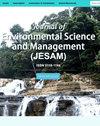菲律宾甘蔗(Saccharum officinarum)和糖蜜生产生物乙醇的社会经济和环境影响
IF 0.3
4区 环境科学与生态学
Q4 ENVIRONMENTAL SCIENCES
引用次数: 4
摘要
随着菲律宾生物乙醇工业的发展达到十年,关于何种生物乙醇混合应强制实施的辩论,本研究评估了国内生物乙醇生产与生物燃料法目标平行的社会经济和环境影响。根据所研究的三个生物乙醇生产系统(BPS) 2017-2018年作物年(CY)的实际生物乙醇加工数据,该国的生物乙醇生产创造了大量就业岗位或估计约2,073个就业岗位;如果这两家生物乙醇工厂的生产能力得到满足,可能会增加10,620个工作岗位。此外,在就业机会和生物乙醇相关业务的现金收入方面,生物乙醇工业被认为对甘蔗农民有积极的变化。2017-2018年,国内生物乙醇行业甚至为生物乙醇相关行业带来了约12亿菲律宾比索(2390万美元)的额外收入,如果生物乙醇工厂能够达到其安装的工厂和热电联产能力,甚至可能达到30亿菲律宾比索(6040万美元)。另一方面,环境影响评估研究显示,与使用化石燃料的常规情况相比,国内生物乙醇生产可以减少约68%至91%的温室气体排放。本文章由计算机程序翻译,如有差异,请以英文原文为准。
Socio-economic and Environmental Impacts of Bioethanol Production from Sugarcane (Saccharum officinarum) and Molasses in the Philippines
As the Philippine bioethanol industry reaches a decade and the debate on what bioethanol blending shall be imposed, this study assessed the socio-economic and environmental impacts of domestic bioethanol production parallel to the objectives of the biofuels law. Bioethanol production in the country has generated significant jobs or an estimated jobs of about 2,073 based on the actual bioethanol processing data for Crop Year (CY) 2017-2018 for the three bioethanol production systems (BPS) studied; and could potentially reach 10,620 jobs if mill capacities of the two bioethanol plants are met. Additionally, bioethanol industry was perceived to have a positive change for sugarcane farmers in terms of employment opportunities and cash income from bioethanol-related operations. The domestic bioethanol industry has even opened additional revenues to bioethanol-related industries of about PhP 1.2 B (23.9 M USD) for CY 2017-2018 and could even reach to PhP 3.0 B (60.4 M USD) if bioethanol plants can attain its installed mill and cogeneration capacities. Environmental impact assessment study, on the other hand, revealed that domestic bioethanol production can reduce GHG emissions by about 68 to 91% for the four BPS evaluated, compared to business-as-usual scenario of using fossil fuel.
求助全文
通过发布文献求助,成功后即可免费获取论文全文。
去求助
来源期刊

Journal of Environmental Science and Management
ENVIRONMENTAL SCIENCES-
CiteScore
0.90
自引率
0.00%
发文量
10
审稿时长
2 months
期刊介绍:
The Journal of Environmental Science and Management (JESAM) is an international scientific journal produced semi-annually by the University of the Philippines Los Baños (UPLB).
JESAM gives particular premium to manuscript submissions that employ integrated methods resulting to analyses that provide new insights in environmental science, particularly in the areas of:
environmental planning and management;
protected areas development, planning, and management;
community-based resources management;
environmental chemistry and toxicology;
environmental restoration;
social theory and environment; and
environmental security and management.
 求助内容:
求助内容: 应助结果提醒方式:
应助结果提醒方式:


